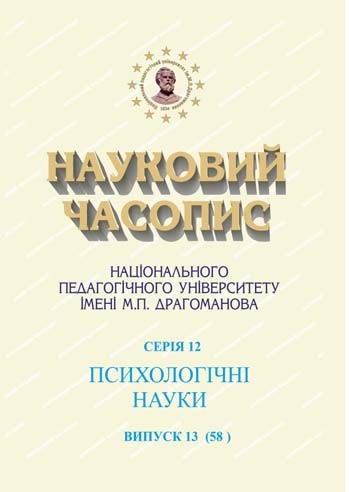PSYCHOLOGICAL FEATURES OF STRESS RESISTANCE AMONG FUTURE PSYCHOLOGISTS
DOI:
https://doi.org/10.31392/NPU-nc.series12.2021.13(58).03Keywords:
stress resistance, stress, distress, coping strategies, adaptationAbstract
Objective. Analysis of psychological features of stress resistance among future psychologists. Research methods: theoretical (comparison, systematization, generalization, interpretation of existing theoretical approaches and empirical results; empirical (testing); methods of mathematical statistics (criterion χ2 - Pearson, Pearson's linear correlation method).
Results. It was found that most students have a low stress level, tend to type B, and have a sufficient level of stress resistance. The study of coping strategies indicates a virtually equal distribution in the group of respondents of the types “Solution”, “Avoidance”, “Settlement of emotions”, with a slight predominance of the latter. The peculiarities of the dynamics of stress resistance among the students-psychologists during their studies in the Free Economic Zone are established: first-year students have a higher level of stress, they are more prone to stress in general and the predominance of coping strategy “Avoidance”. Instead, senior students are characterized by higher stress resistance and dominance of the coping strategy “Solution”. The correlation between the high level of stress resistance and the specified coping strategy are revealed.
Conclusions. It is established that stress resistance is an important personal characteristic that involves the ability to self-regulate, manage their own mental states, the ability to overcome life difficulties without feeling the destructive effects of distress. It was found that most students of psychology have a sufficient level of stress resistance. There are pronounced coping strategies aimed at maintaining emotional stability, preventing the stressful situation from significantly changing the emotional background of the individual. There are also coping strategies aimed to avoid stressful situations that prevent distress. There is an intention to solve the problem situation, based on its perception as a specific task that prevents it from getting stuck in it due to less emotional involvement. The specifics of the stress resistance dynamics is revealed: with senior students it becomes higher, they are characterized by adaptive coping strategies.
References
- Bilova, E. (2007). Psykholohichni osoblyvosti osib z riznym rivnem stresostiikosti (na prykladi pratsivnykiv stresohennykh profesii) [Psychological features of people with different levels of stress resistance (on the example of workers of stressful professions)]. Extended abstract of Candidate’s thesis. Odesa [in Ukrainian].
- Burban, N., & Huzenko, (2019). Osoblyvosti stresostiikosti y adaptyvnykh zdibnostei do stresu maibutnikh viiskovosluzhbovtsiv [Features of stress resistance and adaptive abilities to stress of future servicemen]. Pedahohika i psykholohiia profesiinoi osvity – Pedagogy and psychology of vocational education, 1, 105–116 [in Ukrainian].
- Kravtsova, O.K. (2019). Stresostiikist osobystosti yak psykholohichnyi fenomen: osnovni teoretychni pidkhody [Stress resistance of the individual as a psychological phenomenon: basic theoretical approaches]. Visnyk pisliadyplomnoi osvity. Seriia: Sotsialni ta povedinkovi nauky – Bulletin of postgraduate education. Series: Social and behavioral sciences, 7, 98–117 [in Ukrainian].
- Pluzhnyk, Ya.A. (2011). Sotsialno-psykholohichni determinanty orhanizatsiino-upravlinskykh stresiv [Socio-psychological determinants of organizational and managerial stresses]. Extended abstract of Сandidate’s thesis. Luhansk [in Ukrainian].
- Carron, А.V. & Morford W.R. (2016). Anxiety, Stress and Motor Learning. Perceptual and Motor Skills, 27(2), 507–511.
- Schоnfeld, Р. (2016). The effects of daily stress on positive and negative mental health: Mediation through self-efficacy. International Journal of Clinical and Health Psychology, 16(1), 1–10.
- Shevchenko, R. (2017). The useful concept of stress and its effects on the individual. Fundamental and applied researches in practice of leading scientific schools, 5(23), 27–35.
- Wersebe, Н. (2018). The link between stress, well-being, and psychological flexibility during an Acceptance and Commitment Therapy self-help intervention. International Journal of Clinical and Health Psychology, 18(1), 60–68.

